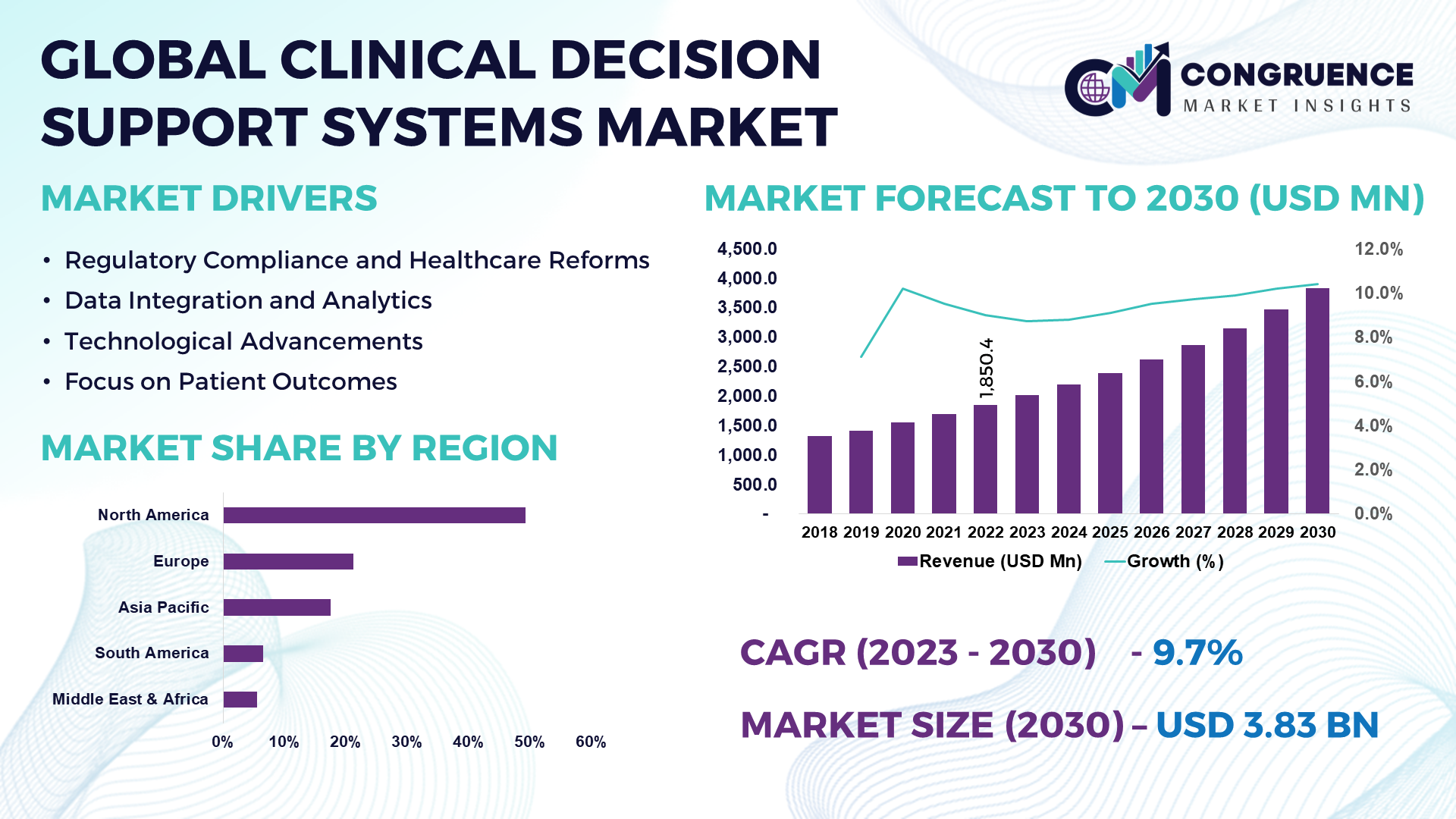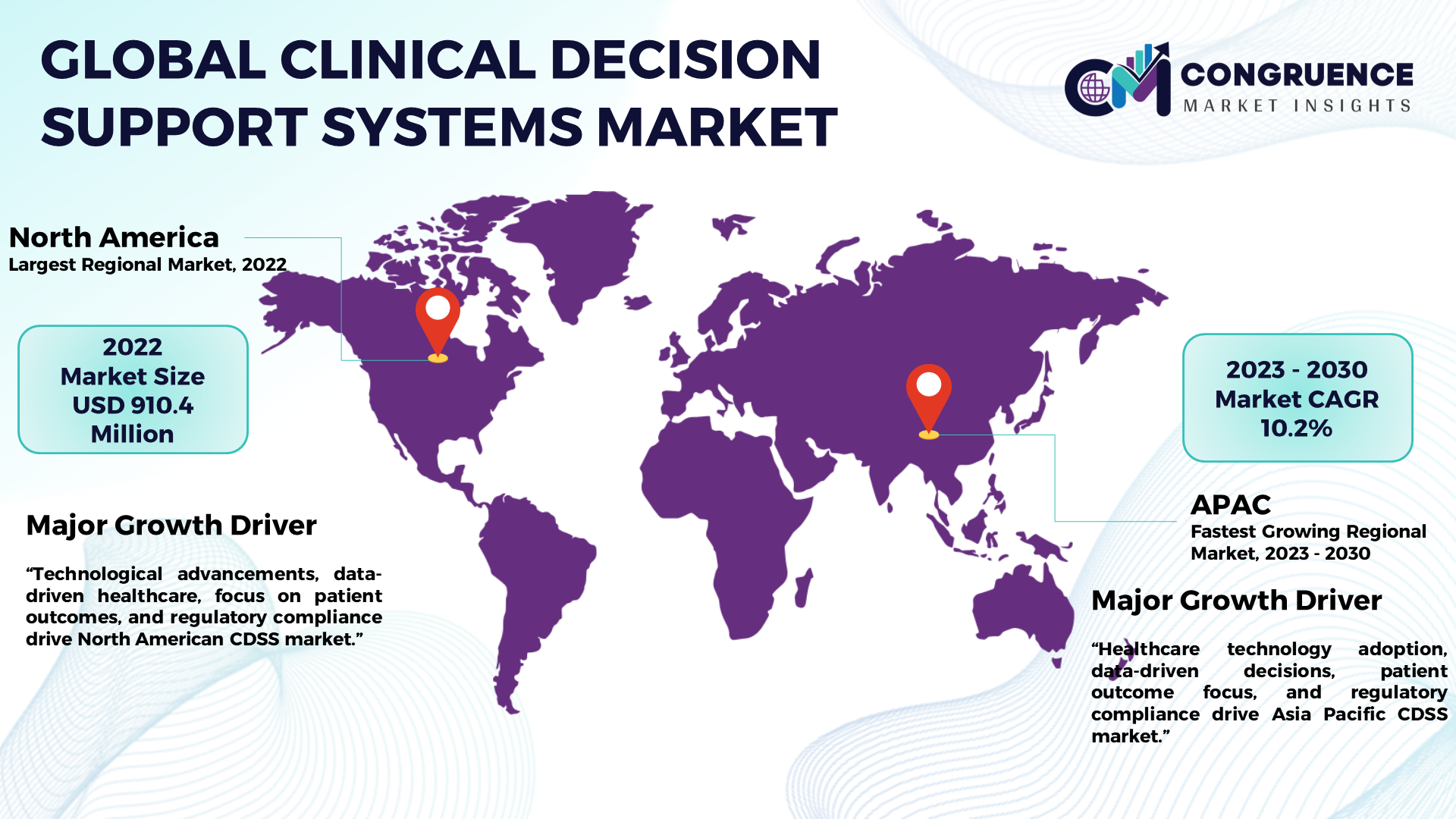Reports
Clinical Decision Support Systems Market Forecast 2023 to 2030
The Global Clinical Decision Support Systems Market was valued at USD 1,850.4 Million in 2022 and is anticipated to reach a value of USD 3,834.6 Million by 2030 expanding at a CAGR of 9.7% between 2023 and 2030.

To learn more about this report, request a free sample copy
A Clinical Decision Support System (CDSS) market is one that is related to software and technology solutions that assist medical practitioners in making clinical choices. These tools provide patient information data of the patient to the medical professional and helps in diagnosing the disease. To assist physicians in making educated judgments, CDSS software often integrates patient information, clinical standards, medical guidelines, and occasionally artificial intelligence or machine learning algorithms. Clinical Decision Support Systems are flexible enough and they are applicable even in specialized hospitals as well as in primary care clinics. They reveal patterns and trends in patient data that help healthcare organization to make wider-scale decision for population health management as well as individual patient care. These systems not only support proper utilization of the available medical resources but also ensure optimum cost allocation by avoiding unnecessary procedures or tests. CDSS are useful for the healthcare professional as it keeps a healthcare provider side by side of the existing clinical guidelines and researches that boost efficient and effective service delivery. This comes due to the overwhelming sizes of the patient data and the increasing intricacy of medical facts. Given the rapid development of technology and a rise in importance of data analytics, CDSS is forecasted to remain a prominent leader in medicine where a patient gets most appropriate treatment relying on new and relevant data.
How AI is Transforming Clinical Decision Support Systems Market?
CDSS market is being revolutionized by AI in diagnosis as well as the decision-making capabilities of Clinical Decision Support Systems. AI can also learn patient data, medical history and information and relevant research at immense scale to recommend to patients and look for patterns usually not visible to clinicians. The use of AI in developing CDSS tools provides information on prognosis, diagnosis, and the likelihood of developing disease, and probability of an outdated treatment plan. Further, it escalates EHRs through AI, thus making constant modifications possible, increases productivity, enhances results and decreases medical mistakes among patients.
Clinical Decision Support Systems Market Major Driving Forces
· Improved Patient Care and Safety: CDSS systems improve patient care by minimizing the probability of negative consequences and medical errors. This is achieved by providing insightful information about the patient to the medical professionals.
· Advancements in Technology: Integration of advanced technological tools such as artificial intelligence and machine learning has supported the CDSS systems to become even more precise and accurate in their clinical recommendation.
· Growing Healthcare expenses: The inflating prices in the healthcare business has encouraged the adoption of CDSS system which is a very inexpensive tool that can make fairly precise decisions and somehow minimize the expenditure on the healthcare.
· Healthcare Professional Efficiency: The ability of CDSS system to make decisions precisely and quickly not only streamlines the workflow but also reduces administrative workload, thereby drastically improving the productivity and efficacy of the professionals.
Clinical Decision Support Systems Market Key Opportunities
· Improved Treatment and Disease Management: There is an opportunity to highlight how CDSS can strengthen disease management, mitigate medical errors, and eventually improve the health of patients. CDSS is expected to help clinicians to arrive at quicker, more educated decisions that can improve treatment and wellbeing of the patient.
· Reduce Healthcare Expenses: The CDSS system is extremely popular since it is very reasonably priced. The popularity of CDSS is not only attributed to its accuracy and dependability but also to the expensive nature of traditional healthcare facilities.
· Global Market Expansion: The demand for CDSS system is not limited to fewer regions but has a global demand landscape. Deploying the CDSS system in growing economies with rapidly expanding healthcare system presents a big opportunity.
Clinical Decision Support Systems Market Key Trends
· The CDSS system is now much more efficient due to the increased speed and accuracy that have been generated by the incorporation of artificial intelligence in these systems.
· CDSS not only assists in diagnosis and recommendation but also helps in office works such as optimizing the workflow and managing the administrative burden.
· The ability of CDSS to assist medical professionals with challenging diagnostic tasks is increasing on a daily basis. The CDSS system is utilized by pathologists and radiologists to improve the preciseness of their medical assessments.
· Personalization of the treatment is another trend that is gaining popularity. CDSS system is one such system that provides personalized treatments.
· Integration of blockchain technology is another trend on the rise. This technology guards against online data theft and assures data security.
· CDSS is providing a platform to facilitate interdisciplinary collaboration to tackle a particular situation such as collaboration of doctors, nurses, pharmacists, administrator and others.
· Another trend that is getting traction is that CDSS gathers all available patient data, analyzes it and creates a comprehensive picture of the patient's overall health.
Region-Wise Market Insights
North America accounted for the largest market share at 49.2% in 2022 whereas, Asia Pacific is expected to register the fastest growth, expanding at a CAGR of 10.2% between 2023 and 2030.

To learn more about this report, request a free sample copy
In the North American region, particularly the USA and Canada have a robust healthcare infrastructure, thereby aiding in the swift adoption of clinical decisions support systems. The adoption of CDSS has been fueled by regulatory initiatives such as the Health Information Technology for Economic and Clinical Health (HITECH) Act in the United States. The proliferation of research institutes and medical care IT enterprises fosters innovation in the CDSS technology.
· In December 2023, Epic Systems announced updates to its CDSS platform, enhancing the integration with electronic health records (EHRs) and adding more predictive algorithms for better clinical outcomes.
The Europe has a significantly developed healthcare infrastructure and hence contributes in easier adoption of the CDSS system.
· In February 2024, Elsevier Health launched a new suite of decision support tools aimed at providing clinicians with up-to-date clinical evidence and guidelines within their EHR systems.
In Asia- Pacific region, rapid expansion in healthcare sector especially in countries such as China and India has fueled the swift adoption of CDSS. Owing to their large population, CDSS also helps in maintaining, analyzing and streamlining patient data. Latin America region has a mixed level of embracement for CDSS systems. Larger economies, such as Brazil, have better healthcare infrastructure, which leads to higher adoption rates; in contrast, less developed regions have lower adoption rates.
Recent Market Developments
· In September 2024, Oracle Health announced that it has continued to deliver electronic health record (EHR) innovations that help clinicians streamline routine tasks and deliver more efficient, informed patient care.
· In June 2024, DocMode launched AIDE, an AI-Driven Clinical Decision Support System aimed at enhancing clinical decision-making and patient outcomes for healthcare professionals globally
· In April 2023: IBM collaborated with several healthcare providers to integrate AI capabilities into its Watson Health services in an effort to deliver more precise clinical decision support
· In July 2020: Cerner Corporation announced a partnership with Holon Solutions to enhance their CDSS technology, focusing on improved patient outcomes through advanced decision support
Market Competition Landscape
The global clinical decision support systems market is characterized by fierce competition among numerous manufacturers with multiple companies striving put their stronghold on the market.
Key players in the global clinical decision support systems market implement various organic and inorganic strategies to strengthen and improve their market positioning. Prominent players in the market include:
· Cerner Corporation
· Epic Systems Corporation
· McKesson Corporation
· Philips Healthcare
· IBM Watson Health
· Zynx Health (Part of Hearst Health)
· Elsevier Clinical Solutions
· UpToDate (Part of Wolters Kluwer)
· EBSCO Health
· 3M Health Information Systems
· VisualDx
· Health Catalyst
CDSS system designed by Cerner Corporation is widely popular for its decision making in healthcare sector. Epic Systems on the other hand has developed a CDSS system which has a user friendly interface. Besides this, Clinical Decision Support, LLC provides CDSS that allows medical professionals to determine the patient's course of care based on genomic and patient-specific data.
Emerging Startups to Intensify Market Competition
· Aidoc: Aidoc was established in 2016, and the company is based in Israel. The company offers a clinical decision support which is an AI powered tool. The Aidoc application is devised to help radiologists and other healthcare workers to examine MRI images and alert them to potentially catastrophic findings in realtime. Aidoc harnesses deep learning to analyze CT and MRI scans for pathologies such as intracranial haemorrhage, ischemic stroke, pulmonary embolism, etc., which saves time, and, consequently, a patient’s life. Having received FDA clearance for multiple algorithms, Aidoc is implemented in hospitals in different countries to help radiologists deliver faster and more accurate results.
· Tempus: Tempus was founded in 2015, and it is a clinical support company that offers an individualized oncology care solutions. Tempus is a platform through which physicians can obtain clinical information combined with molecular/genomic data to aid in choosing the best course of action for the treatment of the cancerous patient. The company offers decision support systems using artificial intelligence technology that helps to match suitable therapy to patient’s genotypes. Tempus collaborates with hospitals and research centers to enhance the experience of precision medicine into clinical practice as soon as possible.
|
Report Attribute/Metric |
Details |
|
Market Revenue in 2022 |
USD 1,850.4 Million |
|
Market Revenue in 2030 |
USD 3,834.6 Million |
|
CAGR (2023 – 2030) |
9.7% |
|
Base Year |
2022 |
|
Forecast Period |
2023 – 2030 |
|
Historical Data |
2018 to 2022 |
|
Forecast Unit |
Value (US$ Mn) |
|
Key Report Deliverable |
Revenue Forecast, Growth Trends, Market Dynamics, Segmental Overview, Regional and Country-wise Analysis, Competition Landscape |
|
Segments Covered |
By Type (Knowledge based and Non- Knowledge based) By Deployment Model (On- Premises and Cloud- Based) By End-user (Hospitals, Clinics, Pharmacies, Insurance agencies, Patients and others) By Application (Clinical Diagnosis, Medication Management, Radiology, Laboratory Testing and Others) |
|
Geographies Covered |
North America: U.S., Canada and Mexico Europe: Germany, France, U.K., Italy, Spain, and Rest of Europe Asia Pacific: China, India, Japan, South Korea, Southeast Asia, and Rest of Asia Pacific South America: Brazil, Argentina, and Rest of Latin America Middle East & Africa: GCC Countries, South Africa, and Rest of Middle East & Africa |
|
Key Players Analyzed |
Epic Systems, Cerner Corporation, McKesson Corporation, IBM Watson Health, Zynx Health, UpToDate, Elsevier Clinical Solutions, Clinical Decision Support, LLC, EBSCO Health, VisualDx |
|
Customization & Pricing |
Available on Request (10% Customization is Free) |
